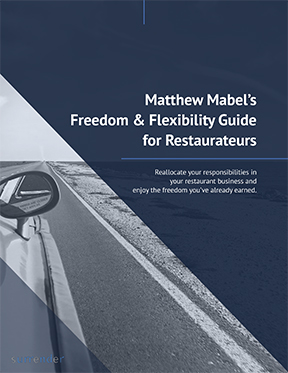
Your grill cook – the person who prepares that steak exactly to temperature – has a better sense of balance on the grill than you do on accountability in your restaurant.
To the visionaries who start their organizations and become the successful multi-unit independent restaurateurs that I work with, accountability does not usually come naturally.
That’s because vision always moves on to the next thing.
Accountability, however, focuses on today.
Accountability Dictates Results
Typically, when I start working with a new client, accountability is lacking.
Once in a while, though, I see an exception. A negative one – where there’s so much accountability that people feel stifled.
That’s the way it is in restaurants. They typically serve their accountability either under cooked or burnt.
Holding people accountable says, “We take a serious approach. We mean what we say. We have given you the tools you need to create results – and we expect you to use them.”
Not holding anyone accountable says, “Everything is optional. We only pretend to be in charge, so pick and choose what you think ought to happen.”
Matthew’s Three Essential Rules of Accountability
- Expect results. Never create a policy, initiative, or directive without attaching a specific result to it and time to finish. Don’t agree, “We are going to up our service game.” Instead, agree, “We are going to up our service game. Do you have the time and tools to raise the mystery shopping score 10 points (or raise Yelp and Google scores, or survey data) in the next 60 days?”
- Signpost to success. Check back with responsible people during the process. If something takes four weeks, outline activities and incremental results of each of those four weeks. So, if you rework 12 recipes to reflect a lighter approach on the menu, commit to three a week for four weeks. Without this step, it may be too late when you ask at the deadline.
- Show up at the finish line. Put a note in your phone with an alarm on the due date for completion. When you check back on time, people will respect you. If you fail to check on time, people will feel either like the child who comes home with the great report card their parents don’t want to read or the child who has just broken through new boundaries on what they can get away with.
People don’t spend a lot of time thinking about accountability in the middle of a busy day when the produce delivery van seems AWOL and two servers have called in sick at 10 AM, or when a party of 25 walks in at 8:00 PM.
How you handle accountability sets the tone for everything in your organization.
Over to you. Your accountability steak…raw or burnt? If it was “just right,” what would the results be in your restaurant?

